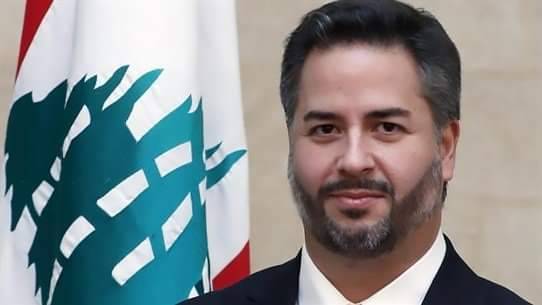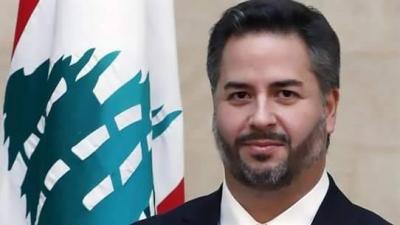Economy Minister Amin Salam announced that Prime Minister Najib Mikati's government has put the train on track by achieving a preliminary agreement with the International Monetary Fund (IMF). However, the new parliamentary council must continue the path and approve the necessary reform laws; otherwise, the final agreement will be postponed until after the presidential elections. This means entering 2023 with the country in a very difficult economic situation and facing significant challenges regarding exchange rates and public finances.
In a special interview with Al-Ghad TV, broadcasting from Cairo and London, Salam stressed that the agreement with the IMF is the only proposed solution for Lebanon, and there are no other solutions. While some may think that the three or four billion dollars Lebanon will receive won't solve the crisis, the most important aspect is the trust Lebanon will gain as a result of this agreement.
He noted that it was expected for the outgoing parliament to postpone the laws related to the comprehensive economic plan to the new council since they pose difficult and "unpopular" options. However, these are fundamental pillars in the economic recovery plan, which is now known to include restructuring banks, the issue of banking secrecy, approving the 2022 budget, and capital control.
The Economy Minister hoped that the new parliament would not delay in discussing and positively engaging with the plan and quickly making the necessary final decisions, paving the way for a final and practical agreement with the IMF, as the country's interest requires this final agreement and the timely approval of the laws, unlike in the past.
**Recovery Plan**
In response to a question about leaked details of the plan that were considered shocking, Minister Salam clarified that the main point of contention revolves around who will bear the losses: the state and the central bank, the banks, or the depositors. He pointed out that the options studied were overall difficult, but the priority for the government and the IMF mission was to protect depositors and consider their rights as sacred and fundamental. The work within the framework of the plan focused on how to distribute the losses without destroying the banking sector.
Regarding the objection from both the Banks Association and economic bodies to the plan, Salam noted that the demands of various entities could help improve certain aspects of the plan, but there is no easy solution or plan that serves a particular side; everyone will bear part of the responsibility. He reiterated that the goal is to reach a formula that does not destroy the essential sectors, specifically the banking sector, as it is impossible to continue the process of economic recovery and development without a banking sector.
Minister Salam rejected the notion that the recovery plan would lead to the cancellation of state debts and shift losses to a particular party. He also declined to mention any percentages for how losses would be distributed, affirming that this is not possible until there is a final understanding between the state, the central bank, and the banking sector, and certain parts of the plan are improved. Before that, many interrelated details must be clarified, starting from the decision regarding state assets and whether they will be privatized or subject to PPP (public-private partnership), how state investments will affect depositors and their share, the sovereign fund, and what it will represent, in addition to details on the restructuring of banks and the number of banks that will be merged or continue in their current status.
**Identification of Small Depositors**
In response to a question about identifying small depositors, Economy Minister Salam said that Prime Minister Najib Mikati recently pointed out that small depositors have more than 800,000 accounts in Lebanon ranging from $100,000 to $200,000. He added that ten percent of depositors hold amounts between $200,000 and $5 million, with a small percentage owning more than $5 million. Dr. Salam continued that the focus is on finding complete protection for the first group, meaning those holding amounts between $100,000 and $200,000, as their deposits represent end-of-service compensations or savings for future use. It has been stated that the first $100,000 will be fully protected for each account with every bank.
He emphasized that, as the Economy Minister, he insists that the funds that left Lebanon after the October 2019 protests should be the subject of investigation and accountability, regardless of their value. He pointed out that the governor of the central bank and the Minister of Finance should have sufficient details about the amount of money that left during this period.
In response to a question, Minister Salam stated that the dollar exchange rate will no longer be subject to a stabilization policy but will be governed by supply and demand, similar to what occurs in various countries worldwide. He predicted that if the elections are completed, followed by an agreement with the IMF and the issuance of implementation decrees for public procurement and competition laws, the dollar exchange rate is expected to drop to below 20,000 Lebanese pounds.
**No Wheat Crisis**
The Economy Minister confirmed that financing the wheat support for bread is secured by a decision from the Council of Ministers and is awaiting approval of the financing program with the World Bank, which will facilitate importing wheat for nine months. He anticipates the program to launch within two months after obtaining the upcoming approval from the bank’s board of directors, which did not impose any conditions regarding this matter that relates to the citizens’ livelihood, with the Ministry of Economy overseeing its proper use.
Regarding wheat imports, which were mostly sourced from Ukraine, he stated that Lebanon is coordinating with European countries and others neighboring Ukraine to provide wheat that meets Lebanese specifications. There is also discussion with India, the United States, and Canada, although transportation costs from these countries are very high. In any case, there is no problem as the Lebanese market is small, consuming no more than 50,000 tons per month.




